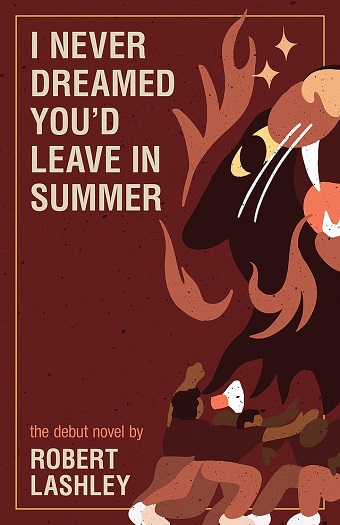I Never Dreamed You’d Leave in Summer by Robert Lashley
I have read and heard Robert Lashley’s work for more than 15 years. He has published three books of poetry and has presented his work in venues across the country.
In 2021, at the peak of the pandemic, Lashley gave a live 10-poem performance via Zoom. Filmed at Mount Baker Theatre’s Walton Theatre with just four audience members allowed in the theater, he delivered a performance both forceful and melancholy. It’s required listening for anyone who wants to familiarize themselves with the not-so-quiet storm that is Robert Lashley.
Lashley’s first novel, “I Never Dreamed You’d Leave in Summer,” is a human story, a tale told through letters written by a young Black man, Albert, to his mentor, Professor Thompson. The location is modern-day Tacoma, and the theme is regret and second chances. This same theme and location figure heavily in his three books of poetry.
A cursory glance at the titles of some of his poems bear witness to the world inhabited by the novel’s characters: “Elegy for a Stick-Up Kid,” “Ode to a Basement Hair Salon,” “Said the Ghetto Nerd to Narcissus at the Bar” and “From the City Bus that Took My Black Ass to School, 4:51 AM.”
Lashley’s protagonist, Albert, spends much of the novel regretting his past. “I’m not Grendel,” his first letter begins, with melodramatic and literary aplomb. Albert believes he is worse than this evil monster killed by Beowulf, the hero of the thousand-year-old epic poem of the same name. (Note: if you never actually read “Beowulf” in high school, you are in good company. The literary references had me confronting the gaps in my knowledge and flipping through Wikipedia across the entire novel.)
Albert knows Grendel because he has been given a literary education by respected elders in the Black community in Tacoma, including his mama. They have made it their business to provide him every opportunity to succeed. But these opportunities do not protect him from the drug culture on the streets of Tacoma. Born in the Hillside Terrace Housing Projects, Albert is timid and vulnerable and an easy target for a drug dealer named Big Thomas.
Big Thomas offers him protection, food and candy in exchange for running small amounts of drugs and then raises the stakes on Albert. While the novel does not describe sexual assault or violence in detail, these are difficult passages to read through and Albert returns to his thoughts of Big Thomas throughout the novel.
Albert and the other characters in the novel ring as true as those in his poems. (Image courtesy of Robert Lashley)
In a much later scene, Albert is confronted by a young boy nervously pointing a gun at him during a gang initiation and he expresses empathy and sadness. “They prodded him like they prodded me, just like now-faded men in gutters had once prodded them as boys. The specter of all our Big Thomases hung in the air.”
At the beginning of the novel, however, Albert is not so wise nor confident. He is writing from a homeless shelter. His life, he feels, is a series of bad choices and consequences that have left him feeling like a monster, undeserving and repentant.
Deserving or not, Albert is given a second chance working in Mrs. Eulalah’s beauty shop, which becomes the safe refuge in which Albert finds some humanity and acceptance and humor. The women who work there accept him but push him to do better through no-nonsense dialogue and concrete service. Self-pity has no place among the combs and the creams and the Crown Royal.
Albert and the other characters in Lashley’s novel ring as true as those in his poems. The conceit of letter-writing is delivered with an earnestness that elicits empathy. Albert’s voice blends street talk and literary references with a bit of endearing nerd-speak. (“Kick rocks in flip-flops,” he says in an angry rant to his mentor.)
Throughout, there is extensive use of a racial epithet used to refer to Black people, which reads as authentic and integral to the voice of the letter-writer. This slim volume is a fairly quick read, but it will move you and challenge you.
“I Never Dreamed You’d Leave in Summer” is available at independent bookstores and Bellingham and Whatcom County libraries.
Lashley will discuss his novel with fellow author and Western Washington University English Professor Carol Guess at 6 p.m. Monday, Sept. 11 at Village Books, 1200 11th St. Register for the event at villagebooks.com.
Reviewed by Neil McKay, online experience coordinator, Whatcom County Library System
Originally published in Cascadia Daily News, Sept. 8, 2023

